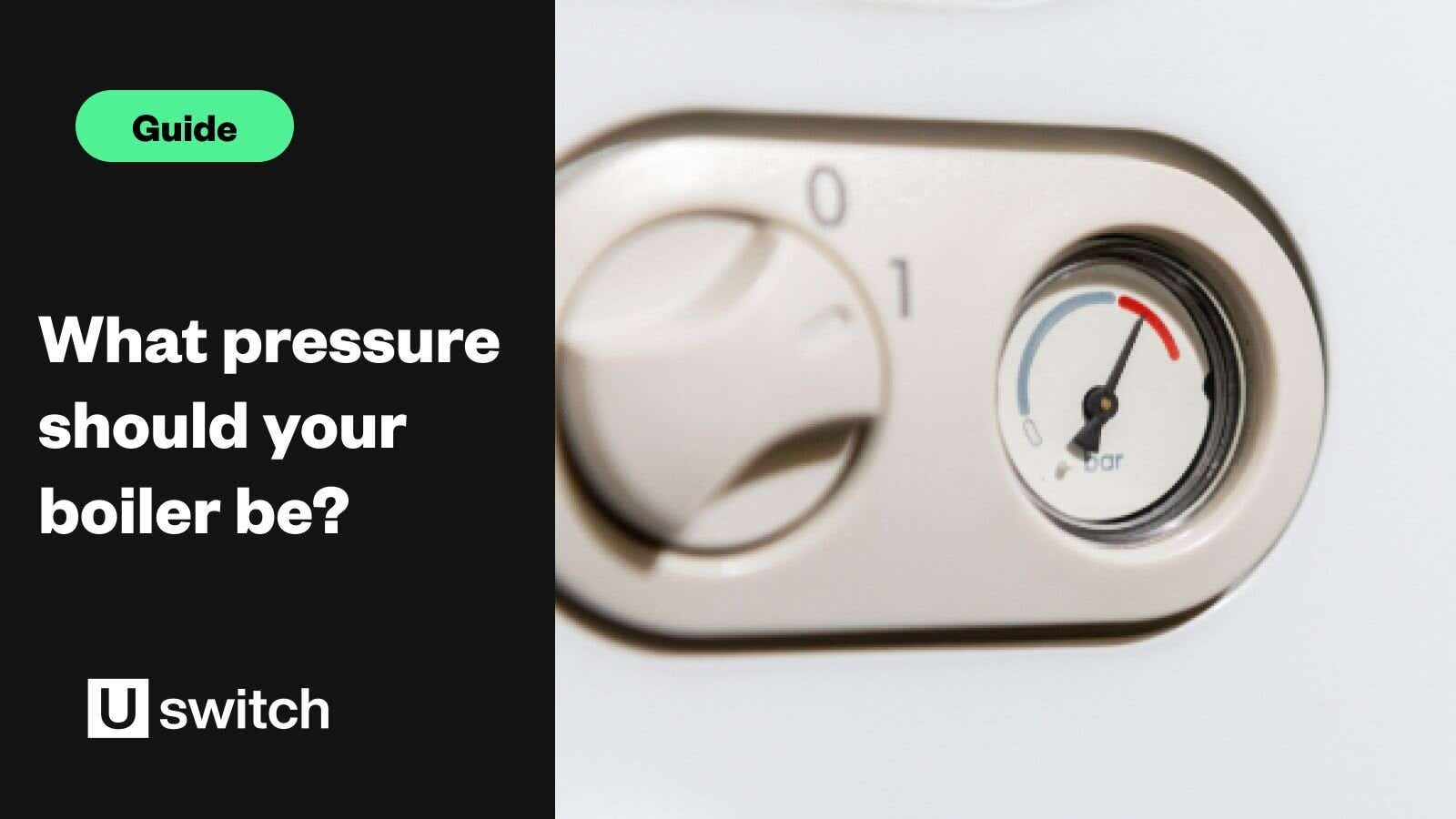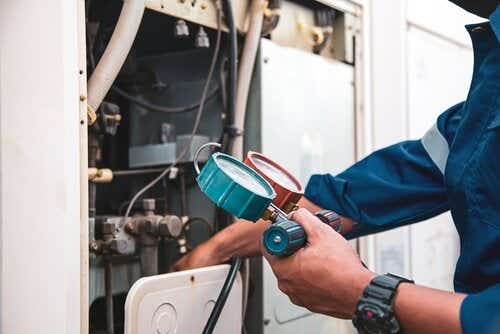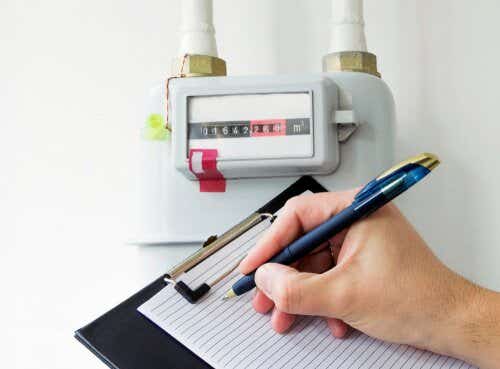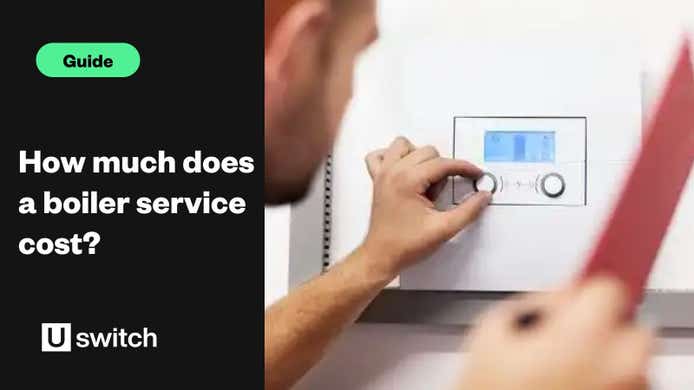Key takeaways
- It’s important to regularly check your boiler pressure
- The pressure should be within the green section of your pressure gauge
- Boiler pressure problems can lead to noise and fluctuating water pressure
- You can fix some boiler pressure issues yourself
- Use a Gas Safe-registered boiler engineer for more complex issues
What is boiler pressure?
Boiler pressure is the force of heated water in your boiler and heating system. Your boiler needs to be at the right pressure so it can send hot water around your pipes and radiators efficiently. If it’s too high or too low, water will not flow sufficiently.
You can check the boiler pressure on the pressure gauge, which is a round dial on the front of your boiler or under the control panel. If you’ve got an older boiler, the gauge might be underneath, among the pipes.
What should my boiler pressure be?
The optimum boiler pressure depends on whether your heating is turned on or off. The indicator needle should be within the green section. If it’s within the red section, your boiler pressure is too low or high.
What happens if my boiler pressure is too low?
If your boiler pressure is too low, your heating system won’t work properly and you’ll struggle to get hot water.
What happens if my boiler pressure is too high?
If your boiler pressure is too high, there’s an increased chance of leaks, overheating and damage to pipes and radiators.
How do I check my boiler pressure?
If you need to check the boiler pressure but aren’t sure where to start, first go to the pressure gauge.
Modern combi boilers have a built-in pressure gauge for easy reading. Your boiler pressure will more than likely be displayed on one of the following:
- A dial
- A hydraulic pressure gauge
- A digital display.
Each pressure gauge should have a green and red section that detects when the pressure is too high or too low.
If it’s in the green section, this means the pressure is just right. If the gauge is showing boiler pressure to be 2.75 or more (red), this means it’s too high. If it’s 0.5 or less (red), this means it’s too low.
Action may be needed if:
- Your boiler is making a lot of noise
- Your radiators take too long to heat up
- Your hot water supply is inconsistent.
These could all be signs of your boiler pressure not being right.
What causes low boiler pressure?
There are a few things that can cause low boiler pressure, including:
- Leaks - your boiler can lose pressure if there is a leak in the pipes or valves. Check your water bill to see if you are using more water than expected, which could indicate a leak
- Bleeding your radiators - when you bleed your radiators, air is released from the central heating system, which lowers the boiler pressure. Always check the boiler pressure after bleeding your radiators to make sure it’s not too low.
It’s important not to keep using a boiler with low pressure as it can damage the boiler. Low pressure also means your boiler will be less efficient, leading to higher energy bills.
How to fix low boiler pressure problems
You can repressurise the boiler by following three steps:
- Find the filling loop: This is usually a silver connection between the mains and the heating circuit.
- Open the filling loop valves: Open the valves at both ends of the loop so that water can get into the system.
- Close the valves: Once the boiler gauge reaches between the 1 and 1.5 bar, you should close the valve.
Before you do anything, always check the boiler instruction manual to make sure you’re following the correct steps. If you’re not confident following the steps, look for a recommended professional.
What causes high boiler pressure?
Your boiler pressure could be too high if:
- You’ve accidentally put too much water in when trying to correct low boiler pressure (overfilled the system)
- You’ve left the filling valves open by accident - this means water will still be flowing in, increasing the pressure as a result.
Don’t keep using a boiler with high pressure as, although there are safety mechanisms to avoid system failure, it could lead to leaks or bursts.
How to fix high boiler pressure problems
If boiler pressure is too high, you should:
- Turn off the boiler.
- Check that the filling valves are fully closed.
- Bleed your radiators to release excess water and pressure.
- Keep bleeding one or more radiators until the pressure gauge is around the 1.2 bar, or in the green zone.
Before you do anything, always check the boiler instruction manual to make sure you’re following the correct steps. If you’re not confident following the steps, look for a recommended professional.
When should I call a professional to investigate boiler pressure issues?
If you’ve tried fixing the boiler pressure yourself but it hasn’t worked, it may be time to call a professional. Make sure you use a qualified and registered Gas Safe engineer as only they are legally permitted to work on boilers in the UK.
Never take risks with boiler issues that seem unsafe or complex. If in doubt, it’s better to call in a boiler expert rather than damage your boiler further or risk being without heating or hot water.
Likewise, if you have a suspected leak or ongoing water pressure problems, it’s a good idea to be proactive and get your boiler checked. Summer is the best time to find a boiler engineer with availability at the cheapest rate.
How to prevent boiler pressure problems
There are a few things you can do to maintain good boiler pressure and to avoid boiler problems:
- Regularly check your boiler pressure
- Get your boiler regularly maintained so any problems with pressure are detected before they become serious
- Book an annual boiler service
- Bleed your radiators periodically so that the pressure isn’t too high
- Be vigilant about leaks.
FAQs
What happens if boiler pressure is too low?
If your boiler pressure is too low, your heating system won’t work properly and you’ll struggle to get hot water. It also means your boiler will have to work harder to heat your home, which can increase your energy bills.
Is it dangerous if boiler pressure is too high?
High boiler pressure isn’t dangerous but it just means that your boiler will struggle to work properly. It also means there’s an increased chance of leaks or damage to pipes and radiators.
How often should I check my boiler pressure?
You should check your boiler pressure at least once a month to make sure it’s not too high or too low. If, in the past, the pressure has been too high or low, you may want to check it every few weeks to avoid any problems.




